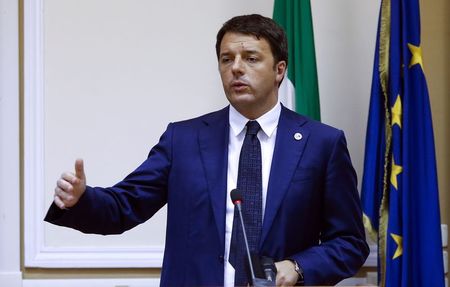ROME (Reuters) - Demonstrators from across Italy filled the streets of Rome on Saturday to protest against labour market reforms which the government of Prime Minister Matteo Renzi has made a cornerstone of its policy.
Red flags bearing the logo of Italy's largest union, the CGIL, waved over town squares as thousands of people rallied behind the group's call for job creation and job security.
The CIGL estimated that 1 million people had turned out by the early afternoon. Members of Renzi's own party also attended the protests, suggesting the issue had created divisions within the government.
The prime minister wants to give businesses more flexibility to hire and fire staff and won majority backing from his party late in September for plans to change employee protection rules that critics say deter companies from hiring new staff, contributing to chronic economic weakness.
"If Renzi and his government have their antennas up, as they usually do, they will receive a very strong signal today which is that the majority of the people who work and who want to work in this country do not agree with their politics," the general secretary of the metalworkers' union Fiom, Maurizio Landini, told Reuters TV.
"If he really wants to change this country he needs to do it with these people, not against us," Landini said.
European policymakers have applauded Renzi's proposals, which also aim to mend a labour market divided between young workers with few employments rights and older employees whose jobs are rigidly protected.
The unusual standoff between labour unions and a coalition led by a left-wing party is also fuelled by wider discontent about austerity policies, including heavy public spending cuts, adopted by governments to meet European Union budget rules.
Italian newspapers said a boat and two planes had been chartered to bring people from the island of Sardinia to join the protests.
DEMOCRATIC PARTY DIVIDED?
Unions and left-wing members of Renzi's Democratic Party (PD) say the proposals undermine workers' rights and do nothing to address the underlying causes of weakness in the Italian economy, which has contracted by around 9 percent since the start of the financial crisis in 2007.
Italy's overall employment rate is one of the lowest in the euro zone, at 55.7 percent in August, and joblessness among young people is running at a record-high 44.2 percent.
As Rome reverberated with stamping feet and whistles, Renzi was in Florence, where he used to be mayor, holding a meeting on jobs and investment with members of his party.
PD members in Florence as well as those attending the protests in Rome fended off questions about whether there was any dispute within the party. Reform Minister Maria Elena Boschi said in Florence there was no conflict between the two events.
Hedge fund founder and long-time Renzi ally Davide Serra said at the meeting in Florence that people had the right to go on strike but warned of possible damage to the economy.
"We should try to understand that there is a cost. Someone who was going to come and invest here tomorrow will not come," Serra told reporters.
Former PD chairman Gianni Cuperlo, who lost out to Renzi in a 2013 race to lead the party, said in Rome that he thought that the unions' demands needed to be addressed.
"These are exactly the requests that we need to address in political debate, within the party and in parliament, to make progress with the reforms this government wants to carry out," Cuperlo told Italy's RAI News.

The CGIL has likened Renzi to Margaret Thatcher, the former British prime minister who fought to weaken trade unions during the 1980s.
(Reporting by Roberto Mignucci and Carmelo Camilli in Rome and Silvia Ognibene in Florence, Writing by Isla Binnie; Editing by Angus MacSwan and Susan Fenton)
